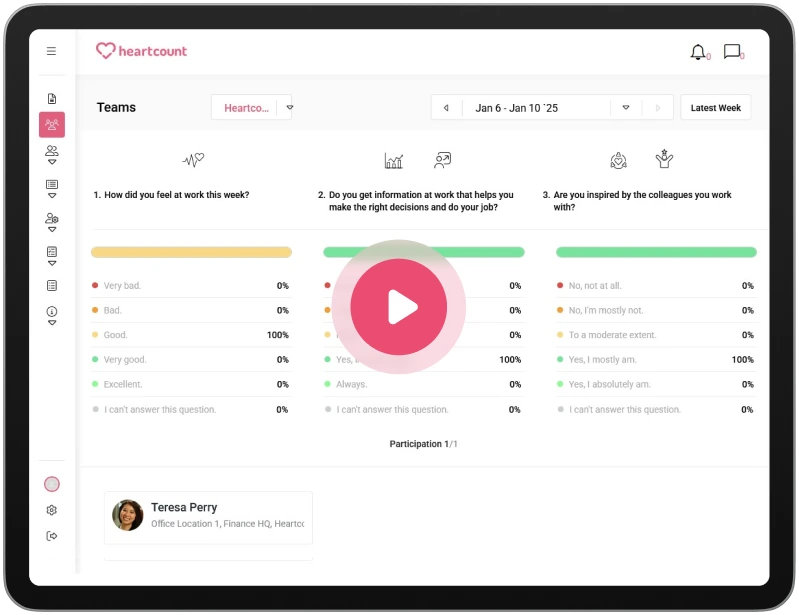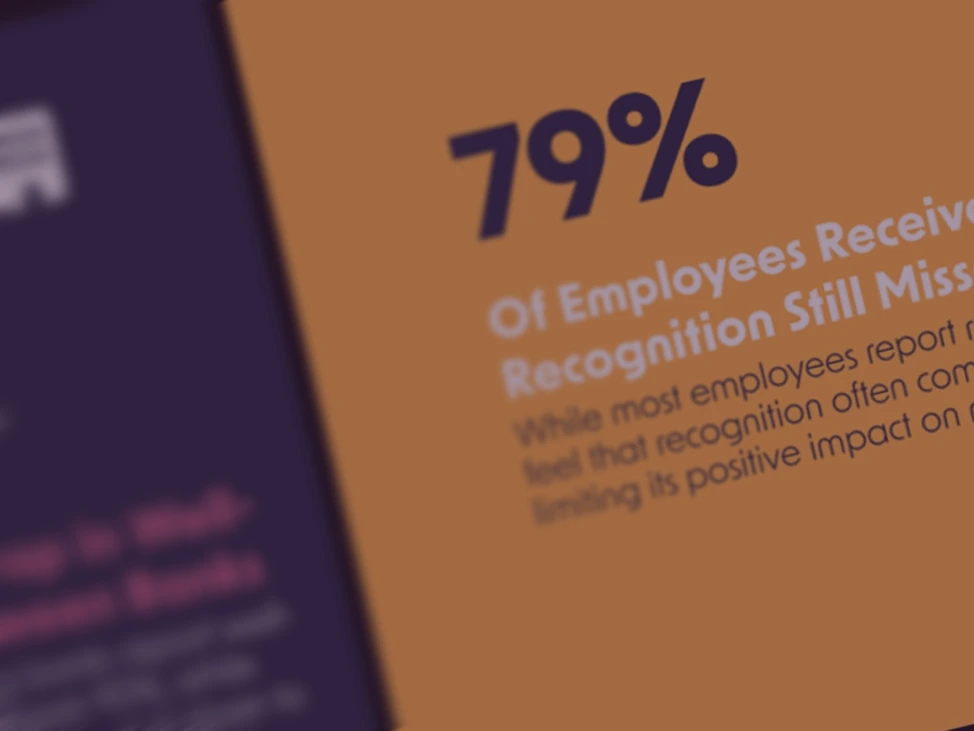How to Boost Employee Morale in 2025: 25 Proven Strategies

If you’ve ever wondered why some teams remain motivated through uncertainty while others disengage, the answer often comes down to morale. More than just satisfaction or occasional enthusiasm, morale is the everyday energy and confidence employees bring to their work. It shapes how they collaborate, solve problems, and decide whether to stay—or look elsewhere.
As organisations adapt to hybrid work, evolving expectations, and economic pressures, leaders are recognising that morale requires deliberate investment. According to McKinsey, companies that prioritise recognition, growth opportunities, and trust-building see significantly stronger retention and performance. Platforms like HeartCount make it easier to track these factors continuously, rather than relying on annual surveys or intuition.
This guide brings together 25 proven strategies you can start using right away to build a culture where employees feel valued, supported, and motivated to give their best. From practical quick wins to bigger culture shifts, you’ll find actionable ideas to help morale become one of your organisation’s strongest assets.
-
1.Why Employee Morale Matters More Than Ever
-
2.Diagnosing Low Morale: Metrics & Common Root Causes
-
3.25 Employee Morale Boosters Grouped by Five Pillars
-
4.How to Boost Team Morale in Remote & Hybrid Workplaces
-
5.Manager Checklist: 7 Actions to Improve Morale This Week
-
6.Listen → Diagnose → Act → Track: The HeartCount Morale Loop
-
7.FAQ: Improving Morale in the Workplace
If you’ve ever wondered why some teams remain motivated through uncertainty while others disengage, the answer often comes down to morale. More than just satisfaction or occasional enthusiasm, morale is the everyday energy and confidence employees bring to their work. It shapes how they collaborate, solve problems, and decide whether to stay—or look elsewhere.
As organisations adapt to hybrid work, evolving expectations, and economic pressures, leaders are recognising that morale requires deliberate investment. According to McKinsey, companies that prioritise recognition, growth opportunities, and trust-building see significantly stronger retention and performance. Platforms like HeartCount make it easier to track these factors continuously, rather than relying on annual surveys or intuition.
This guide brings together 25 proven strategies you can start using right away to build a culture where employees feel valued, supported, and motivated to give their best. From practical quick wins to bigger culture shifts, you’ll find actionable ideas to help morale become one of your organisation’s strongest assets.
Why Employee Morale Matters More Than Ever
In 2025, employee morale isn’t optional—it’s a key driver of performance, retention, and workplace wellbeing. Gallup’s State of the Global Workplace report found global engagement dropped to just 21% in 2024, a rare decline that signals warning signs for business leaders.
Low morale has real consequences: companies with highly engaged teams experience 23% higher profitability, 51% less turnover, 10% better customer loyalty, and 14%–18% higher productivity. On the flip side, disengaged employees—estimated at 22 million in the U.S.—cost the economy up to $350 billion annually.
But morale isn’t just about the bottom line—it’s also a sensitive barometer of team wellbeing. Real-time morale tracking helps leaders surface early signs of disengagement, burnout, or lost trust. The good news? Morale can be boosted rapidly through targeted actions around recognition, communication, autonomy, and growth.
Let’s unpack what morale is—and why it’s different—and then explore how it acts as an early warning signal in pulse data.
Morale vs. Engagement vs. Satisfaction: Quick Definitions
- Morale: an employee’s daily emotional state, reflecting enthusiasm and outlook toward work.
- Engagement: a longer-term commitment, showing discretionary effort and alignment with mission.
- Satisfaction: meeting baseline expectations like pay and perks, but not necessarily driving motivation.
For example, a satisfied employee may still feel low morale during a high-pressure period, while an engaged team might experience short-term morale dips without long-term impact.
Early-Warning Signs in HeartCount Pulse Dashboards
With weekly pulse surveys, HeartCount lets you catch morale issues before they escalate:
- Sliding sentiment scores over consecutive weeks
- Burnout risk alerts (low energy, high stress)
- Recognition gaps—when employees report feeling underappreciated
- Trust erosion—falling confidence in leadership becomes visible before turnover spikes
These signals empower managers to move from reactive to proactive, using data to drive targeted morale boosters before minor issues become major problems.
Diagnosing Low Morale: Metrics & Common Root Causes
Before you can improve morale, you need to pinpoint where and why it’s slipping. In 2025, this means moving beyond gut feelings or one-off surveys to continuous, real-time insights.
How to Measure Morale
Weekly pulse surveys have become the gold standard for tracking morale trends. Unlike annual engagement surveys, they reveal shifts as they happen—so you can intervene before disengagement takes hold. Here are three effective metrics to track:
- Weekly Pulse Surveys: A short set of questions sent every Friday to measure mood, stress levels, recognition, and trust. Tools like HeartCount make this simple and automated.
- eNPS (Employee Net Promoter Score): A single question—How likely are you to recommend our company as a place to work?—that benchmarks advocacy and overall sentiment.
- Burnout Index: A rolling indicator combining stress, workload perception, and energy levels. A rising burnout index is one of the clearest predictors of attrition.
By combining these metrics, you get a clear, real-time picture of team morale, not just isolated snapshots.
Top Root Causes of Low Morale
Morale challenges often stem from a handful of predictable areas. Recognising these patterns helps you tackle root causes rather than symptoms.
Poor Communication & Transparency
When employees feel left out of decisions or kept in the dark about change, trust erodes fast. In hybrid workplaces, clarity and timely updates are especially critical.
Lack of Recognition & Feedback
Gallup has shown that employees who don’t feel recognised are twice as likely to quit within a year. Regular appreciation, whether peer-to-peer or from leaders, is a proven morale booster. For more detail on building a recognition habit, see HeartCount’s guide to recognition in the workplace.
Workload Overload & Burnout
Heavy workloads and constant urgency drain energy. When sustainable pace is ignored, short-term productivity gains quickly lead to long-term disengagement.
Limited Growth or Career Path
Employees want to see a future for themselves. If learning and advancement feel out of reach, morale inevitably declines.
Compensation & Perceived Fairness Issues
While pay isn’t the only motivator, feeling underpaid compared to peers or market averages breeds resentment and low morale.
Leadership Trust Gap
Morale suffers when employees lose confidence in leadership’s competence, fairness, or vision. Restoring trust requires open communication and consistent follow-through.
When you measure these factors weekly, you can spot patterns—like a sudden dip in recognition scores or a spike in burnout risk—and take targeted action quickly.
25 Employee Morale Boosters Grouped by Five Pillars
Improving morale doesn’t mean launching massive programmes all at once. The most effective approach is layering small, consistent actions across the areas that matter most. Below are 25 strategies grouped into five proven pillars.
Recognition & Appreciation
Recognition is one of the fastest ways to boost morale. According to Gallup, employees who feel appreciated are up to 4 times more engaged.
1. Real-Time Shout-Out Feed
Use tools like HeartCount’s Kudos feature to create a live stream of peer recognition that everyone can see. This public appreciation reinforces positive behaviours and keeps momentum high across the team.
2. Peer-Nominated Awards Program
Let employees nominate colleagues who embody company values. Peer-nominated awards feel authentic because recognition comes directly from the people who work alongside each other every day.
3. Public Milestone Celebrations
Celebrate birthdays, work anniversaries, and big project wins during team meetings or via a dedicated recognition channel. These simple gestures remind employees that their contributions—and life milestones—matter.
4. Quarterly Values-Based Awards
Create quarterly awards that align recognition with your culture pillars, such as innovation, collaboration, or customer focus. This connects daily actions to broader organisational purpose and helps reinforce core behaviours.
5. Surprise Thank-You Notes from Leadership
A personal note from a senior leader can be surprisingly powerful, especially when it’s unexpected. Whether it’s a handwritten card or a heartfelt email, this gesture shows employees they are seen and valued beyond KPIs.
Growth & Development
Growth fuels motivation. When employees see a clear path forward, morale and retention improve.
6. Annual Learning Stipend or Udemy Credits
Offer each employee an annual budget to spend on learning opportunities, like online courses or professional certifications. Investing in development demonstrates commitment to long-term career growth.
7. Transparent Internal Mobility Paths
Publish clear criteria for moving into new roles, lateral opportunities, or expanded responsibilities. Transparency prevents frustration and keeps ambitious employees engaged rather than looking elsewhere.
8. Mentorship Circles & Job-Shadowing Days
Pair employees with mentors or let them shadow colleagues in other departments. Exposure to fresh ideas and skills helps break monotony and encourages curiosity. For more ideas on building a high-performance learning culture, see HeartCount’s guide to creating a high-performance culture.
9. Stretch Projects with Executive Sponsor
Invite employees to lead a project that challenges them to grow, backed by an executive sponsor who can remove roadblocks. This combination of autonomy and support builds confidence and pride.
10. “Demo Day” for New Skills Showcase
Host quarterly sessions where employees can present what they’ve learned to peers and leaders. Sharing expertise boosts visibility and celebrates continuous development.
Connection & Team Morale
Strong relationships are essential to resilience and morale, especially in hybrid teams.
11. Monthly Cross-Team Show-and-Tell
Bring different teams together to share wins, challenges, and lessons learned. These sessions promote understanding, respect, and appreciation of diverse roles.
12. Manager “Coffee Roulette” Check-Ins
Randomly pair managers and employees for informal virtual coffees. Casual conversations strengthen trust and open communication beyond formal check-ins.
13. Volunteer / CSR Team-Building Events
Encourage teams to give back to their communities together, whether in person or virtually. Shared purpose outside daily tasks strengthens bonds and builds pride. You can explore more ideas in HeartCount’s resource on free virtual team-building activities.
14. Gamified Team Challenges & Hackathons
Friendly competitions energise teams and unlock creativity. From hackathons to wellness challenges, gamification introduces fun and shared goals.
15. Virtual Escape Rooms or Online Trivia Nights
Lighthearted games help distributed teams connect on a human level. A quick trivia night can do more for morale than an extra meeting ever could.
Well-Being & Work-Life Balance
Supporting mental and physical health is non-negotiable for sustainable morale.
16. No-Meeting Fridays or “Deep-Work” Windows
Protecting blocks of uninterrupted time shows respect for employees’ focus and energy. This simple shift helps prevent burnout and supports more thoughtful work.
17. Flexible Scheduling & Summer Fridays
Offering flexible hours or early finishes in summer helps employees recharge and balance personal commitments. Flexibility is consistently linked to higher morale and engagement.
18. Wellness Stipend & Mindfulness Apps
Provide allowances for gym memberships, meditation subscriptions, or ergonomic home office gear. Supporting wellness signals that the company cares beyond productivity metrics.
19. Burnout Risk Alerts & 1-on-1 “Reset” Talks
Use real-time sentiment data to trigger early conversations about stress and workload. A proactive “reset” meeting can head off deeper disengagement. For more on spotting and preventing burnout, see HeartCount’s insights on why employees quit.
Autonomy & Trust
Empowering employees to shape their work fuels ownership and pride.
20. Goal-Based (Not Hours) Performance Metrics
Measure outcomes rather than hours logged. This autonomy increases trust and often leads to higher-quality work.
21. Team-Set OKRs in HeartCount Check-Ins
Let teams define their own objectives and key results, then track progress together. This approach strengthens buy-in and clarity.
22. Project Pitch Days Where Ideas Get Funded
Create a quarterly forum where employees can pitch proposals and secure resources to bring them to life. This signals that fresh ideas are valued.
23. Employee-Led Policy Committees
Invite employees to help shape policies that affect them, from hybrid work guidelines to recognition programmes. Co-creating policies fosters transparency and trust.
Quick Wins You Can Launch This Week
If you need immediate momentum, start here.
24. Instant Recognition Slack or Teams Bot
Enable quick peer shout-outs in your chat platform with minimal setup. A recognition bot makes it easy to celebrate small wins in real time.
25. Two-Question Friday Pulse for Fast Feedback
End each week by asking two questions: How was your week? and What would make next week better? This lightweight pulse keeps communication open and surfaces morale issues early. To explore more about continuous listening, see HeartCount’s employee experience management platform.
How to Boost Team Morale in Remote & Hybrid Workplaces
Remote and hybrid work have redefined what it means to build a connected, motivated team. Without daily face-to-face interaction, morale can slip quietly as employees feel isolated or unsure whether their contributions are seen. Fortunately, many of the same principles that apply to on-site teams—recognition, growth, and trust—can be adapted to distributed environments.
Here are practical ways to keep morale high no matter where your team works:
1. Prioritise Over-Communication and Clarity
When teams are remote, silence often leads to assumptions. Use consistent, transparent updates about goals, decisions, and progress. Clear documentation and regular check-ins help everyone stay aligned and confident.
2. Build Rituals of Connection
Remote teams thrive on structured rituals that replicate informal office moments. Weekly video stand-ups, virtual coffee chats, and cross-functional “show-and-tells” keep relationships strong and make people feel included.
3. Make Recognition Visible and Frequent
Recognition carries even more weight when employees can’t rely on in-person validation. Tools like HeartCount Kudos or chat-based recognition bots make it easy to celebrate wins in real time, so no one feels their efforts go unnoticed.
4. Offer Flexibility Without Guilt
Allow employees to adjust their schedules to balance work and personal life, and model that flexibility is genuinely supported. When people don’t feel pressured to be “always on,” they’re more likely to sustain energy and positivity. For more ideas on balancing productivity and wellbeing, see HeartCount’s insights on employee well-being.
5. Reimagine Team Building
Swap traditional team outings for accessible experiences everyone can join, like virtual escape rooms, online trivia nights, or shared volunteering initiatives. These activities help teams connect on a human level, reducing isolation.
6. Use Pulse Surveys to Stay Tuned In
In distributed workplaces, it’s easy to lose touch with how employees are feeling day to day. Weekly pulse surveys give you a real-time window into morale so you can spot issues early and act decisively. To learn how continuous listening fuels engagement, explore HeartCount’s guide on how to drive employee engagement.
7. Invest in the Right Tools
Reliable collaboration platforms, clear documentation hubs, and integrated recognition systems reduce friction and help people feel equipped to succeed. Technology is a foundation for both productivity and morale in hybrid teams.
Remote and hybrid work don’t have to mean disconnected work. With a few intentional practices, you can build a culture where employees feel valued, supported, and motivated—no matter where they’re logging in.
Manager Checklist: 7 Actions to Improve Morale This Week
Improving morale doesn’t require months of planning. Small, visible actions from managers can quickly rebuild trust, energy, and a sense of progress. Use this checklist to start making a difference right away:
1. Schedule One-on-One Check-Ins Focused on Wellbeing
Make time for individual conversations that go beyond project updates. Ask open questions about stress levels, workload balance, and what support employees need right now.
2. Recognise at Least Three Team Members Publicly
Send a kudos message, share a story in your team chat, or call out great work during your next meeting. Frequent, specific recognition shows people that their efforts matter.
3. Share Your Team’s Wins with Leadership
Amplify achievements by sharing them with senior leaders or other departments. Recognition that reaches beyond your team reinforces pride and connection.
4. Revisit Workload Priorities Together
Review current projects and clarify what’s most important. Helping people let go of low-priority tasks can reduce overwhelm and signal you respect their time.
5. Offer Flexibility Where You Can
Give team members the option to adjust hours, swap shifts, or block focus time. Even small flexibility helps employees feel trusted and supported.
6. Launch a Two-Question Friday Pulse
End the week with a quick pulse survey: How was your week? and What would make next week better? This lightweight check-in surfaces issues before they escalate.
7. Share a Personal Note of Appreciation
Write a short, sincere message to each team member acknowledging their contributions. Personal notes carry more impact than generic thanks.
Consistent small steps like these, repeated weekly, build a foundation of trust and psychological safety. Over time, they create the conditions where morale naturally thrives.
Listen → Diagnose → Act → Track: The HeartCount Morale Loop
One-off morale initiatives can help in the short term, but sustaining a positive culture requires a structured, repeatable approach. That’s where the Listen → Diagnose → Act → Track loop comes in. This framework helps managers close the gap between sentiment and action, making morale improvements visible and measurable.
Listen
Use weekly pulse surveys to gather real-time feedback on how your team is feeling. Short, regular check-ins make it easier for employees to be candid and create a continuous feedback culture rather than a once-a-year snapshot.
Diagnose
Review the data for patterns. Look for shifts in key indicators like recognition, stress, trust, and engagement. If you’re using HeartCount, dashboards highlight trends automatically so you can see exactly where morale is improving—or slipping.
Act
Based on what you learn, choose targeted actions that address the root causes. For example, if recognition scores are low, introduce more frequent kudos or a peer-nomination programme. If stress is rising, revisit workload priorities or introduce wellbeing resources.
Track
Measure the impact of your actions over time. Comparing sentiment scores before and after each initiative helps you see what’s working and where to adapt. Over weeks and months, this builds a clear narrative of progress that you can share with leadership and your team.
Assign Owners & Deadlines for Each Booster
Morale initiatives work best when they’re someone’s clear responsibility. Assign a point person for each action and set deadlines to keep momentum. This helps ensure follow-through rather than good intentions that fade after a busy quarter.
Use Pulse Trends to Validate What Works
Regularly review your pulse survey trends to confirm which changes are having the biggest impact. Seeing morale improve—even by a few percentage points—reinforces the value of continuous listening and consistent action.
By embedding this loop into your management practices, you create an environment where employees feel heard, supported, and recognised all year round.
FAQ: Improving Morale in the Workplace
Which is a proven method of boosting employee morale?
One of the most effective methods is consistent recognition. When employees feel appreciated regularly—whether through public praise, peer nominations, or leadership shout-outs—motivation and morale improve. Combining recognition with clear growth opportunities and regular check-ins creates a lasting impact.
What would boost your morale at work?
Employees often cite clear communication, meaningful appreciation, and flexible working arrangements as top morale boosters. Simple gestures—like a personal thank-you note, the freedom to adjust schedules, or visibility into how their work contributes to company goals—can make a significant difference.
What does “boost employee morale” actually mean?
To boost employee morale means to improve the overall mood, confidence, and enthusiasm employees feel about their work and workplace. It involves addressing factors like recognition, workload balance, trust in leadership, and growth opportunities so people feel valued and motivated.
How can you motivate staff when morale is low?
Start by listening. Use quick pulse surveys or informal one-on-one conversations to understand what’s driving low morale. Then, act on the feedback—simplify workloads, increase recognition, and involve employees in decisions that affect them.
How quickly can weekly pulses show morale improvement?
Weekly pulses can reveal changes within just a few cycles. When managers take visible action on feedback—like adjusting priorities or improving recognition—employees often report higher morale in 2–4 weeks. Sustained improvements typically build over 1–2 quarters as trust and consistency grow.








